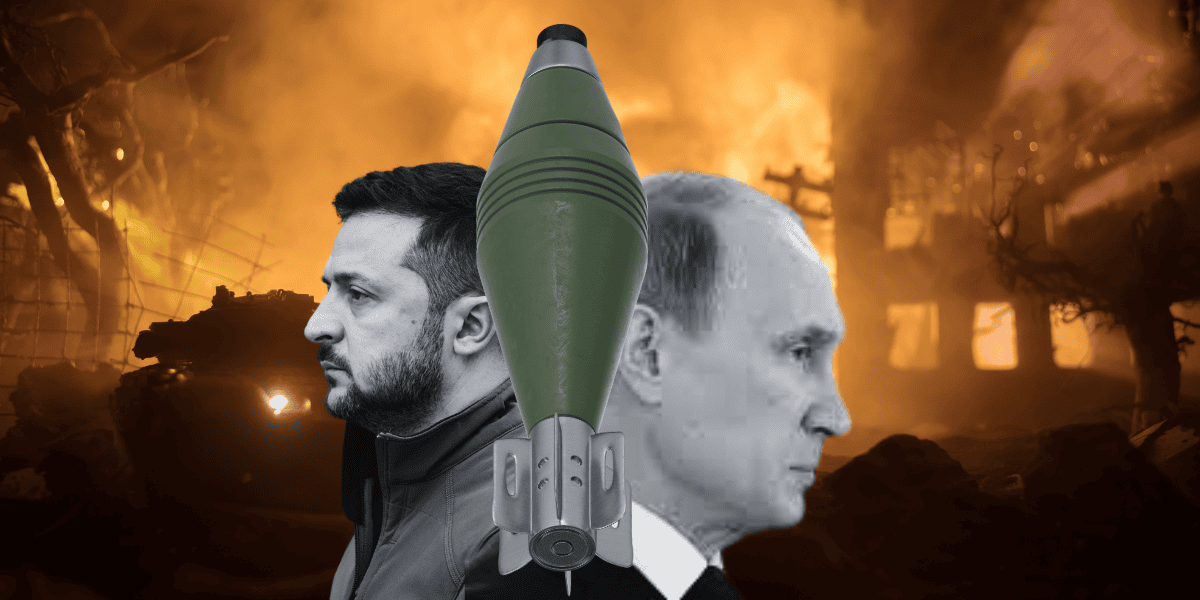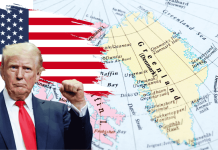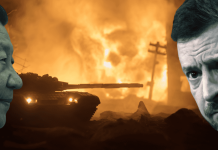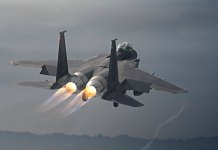With U.S. President Donald Trump playing an active role in accordance with his electoral promise of ending the War in Ukraine and American negotiators meeting their Ukrainian and Russian counterparts in the Saudi capital Riyadh, the common people of both warring countries seem ready for an immediate ceasefire that could lead to a peace agreement, if recent opinion polls by respected agencies are any indication.
It seems that nearly all Ukrainians are stressed and tired of the three-year-old war. A recent poll conducted by Kyiv International Institute of Sociology, or KIIS, found that nearly 9 in 10 Ukrainians experienced at least one stressful situation in the previous year.
Large shares reported stressful experiences related to bombing and shelling (39%), separation from family members (30%), surviving the death of loved ones (26%) and the illness of loved ones (23%).
Secondly, as the war has gone on, more and more Ukrainians are more inclined towards negotiations for an end. A recent Gallup Poll showed that 52% preferred that “Ukraine should seek to negotiate an ending to the war as soon as possible,” whereas 38% preferred that “Ukraine should continue fighting until it wins the war.”
This poll showed that not only in the front line of the conflict, mostly in the country’s East and South, but also in the far-away areas, support for keeping the fighting on has declined sharply from the situation in 2022 when Russia invaded.
Over time, support for continuing the war has withered in all regions in Ukraine, no matter how close to the front line they are. Support dipped below 50% everywhere in 2024. In fact, some of the biggest declines in support for the fight have been in regions far from the front line, including Kyiv (down 39 percentage points) and the West (down 40 points).
Thirdly, and this is important, unlike President Volodymyr Zelenskyy and his European supporters, who want Russia to unconditionally return Ukrainian territories, including Crimea, a fair share of Ukrainians believe that Ukraine should be open to ceding some territory in exchange for peace.

The Gallup poll found that nearly half of this group (52%) agrees that Ukraine should be open to making some territorial concessions as part of a peace deal to end the war, while 38% disagree and another 10% don’t know.
Another latest poll, conducted between February 14 and March 4, 2025, from the respected Kyiv International Institute of Sociology, or KIIS, found a similar trend.
KIIS asked the respondent to choose one of two statements:
-
“In order to achieve peace as soon as possible and preserve independence, Ukraine can give up some of its territories”
-
“Under no circumstances should Ukraine give up any of its territories, even if because of this the war will last longer and there will be threats to the preservation of independence”
According to KISS, the situation was relatively stable from May 2022 to May 2023: about 8-10% of respondents were ready for territorial concessions, and the absolute majority – 82-87%—consistently opposed any concessions.
After May 2023, a gradual increase in the share of those ready for territorial concessions can be observed. Thus, by the end of 2023, the readiness to make concessions increased to 19%, in February 2024—to 26%, and in May 2024—to 32%. The share of those who oppose no territorial concessions, accordingly, steadily decreased in the specified period.
As of this month (March), though half of Ukrainians—50%—believe that Ukraine should never give up territories, even if this makes the war last longer (in December 2024, it was 51%), the number of those willing to make concessions has gone up to 39% (in December 2024 – 38%). The remaining 11% of respondents could not decide on their opinion, according to KISS.
The important point to note here is that the number of those who do not want any territorial compromise is slowly and steadily declining in Ukraine.
What about Russian public opinion?
An analysis by a Massachusetts-based company, FilterLabs, suggests that the Russians are now generally weary of the war, though they do not trust the Americans, including President Trump, to be honest, peace brokers.
Though they apprehend that America and the West could take advantage of Russia, they do admit that they are tired of the war.
It may be noted that FilterLabs, which scrapes social media and internet posts to measure public sentiment in Russia and other parts of the world, has been analyzing the shifts in Russian attitudes toward the war over the last three years.
However, an opinion poll by Russian Field, an independent polling firm, says that 56 percent of Russian respondents said they are in favor of peace talks; 55 percent said they would support a ceasefire without any specific terms, and 76 percent said they would support Putin’s signing a peace agreement with Ukraine.
More than a quarter of respondents (29%) reported that the military operation had the greatest impact on their standard of living, income, and price growth (+8 pp compared to February 2024). About one in five (21%) said that the military operation had the greatest impact on their emotional state, mental health, and nervous system. 9% of respondents reported that their loved ones were involved in the military operation (+1.5 pp compared to February 2024).
Other significant consequences noted by Russians included a feeling of instability and uncertainty (5%), the unavailability of certain goods, services, and payment systems (4.3%), and a feeling of insecurity, shelling, losses, and deaths (4.3%).
According to Russian Field, the impact of the military operation on their standard of living, income, and prices was most often mentioned by men, respondents under 45, people with higher education, and those who believe that the operation is unsuccessful and support the transition to peace talks.
Respondents under 30, wealthy citizens, and those who criticize its progress were more likely to report that the military operation had an impact on the variety of goods and availability of services. Among those who said that the military operation had no impact on their lives, there were more often those who supported its continuation and believed that it was successful, according to Russian Field.
The polling firm says that Russians have mixed opinions about Donald Trump’s role in resolving the conflict between Russia and Ukraine. 45% of respondents believe that Trump is unlikely to seek a solution to the conflict, while 34% hold the opposite opinion.
The older the respondents, the less likely they are to consider Trump a peacemaker. Only among young people (18-29 years old) is the belief that Trump is seeking to resolve the conflict greater than the share of skeptics.
However, overall, 45% of Russians said that it is necessary to move on to peace talks, while 43% support continuing the military operation. But, 76% of Russians would support Vladimir Putin’s decision to sign a peace agreement if it were adopted tomorrow. Such is Putin’s acceptability in the country.
Russian Field surmises that 55% of respondents would support a ceasefire agreement without preconditions. However, 45% of respondents believe that it is unacceptable to return certain territories to Ukraine within the framework of a peace agreement.
Russians most often discuss the unacceptability of transferring what are now said to be the Donetsk People’s Republic (DPR) and Luhansk People’s Republic (LPR), Crimea, Kherson, and Zaporizhia regions. This group also discusses the unacceptability of Ukraine joining NATO and the deployment of foreign troops on its territory.
In sum, public opinion in both Russia and Ukraine, as highlighted above, seems deeply uncertain over the future of the war. Adversely affected by it, they want peace.
They are not debating now who was right and who was wrong about the war. Apparently, they are now for what could be termed “a reluctant consensus” to end it through a ceasefire.
- Author and veteran journalist Prakash Nanda is Chairman of the Editorial Board of the EurAsian Times and has been commenting on politics, foreign policy, and strategic affairs for nearly three decades. He is a former National Fellow of the Indian Council for Historical Research and a recipient of the Seoul Peace Prize Scholarship.
- CONTACT: prakash.nanda (at) hotmail.com




